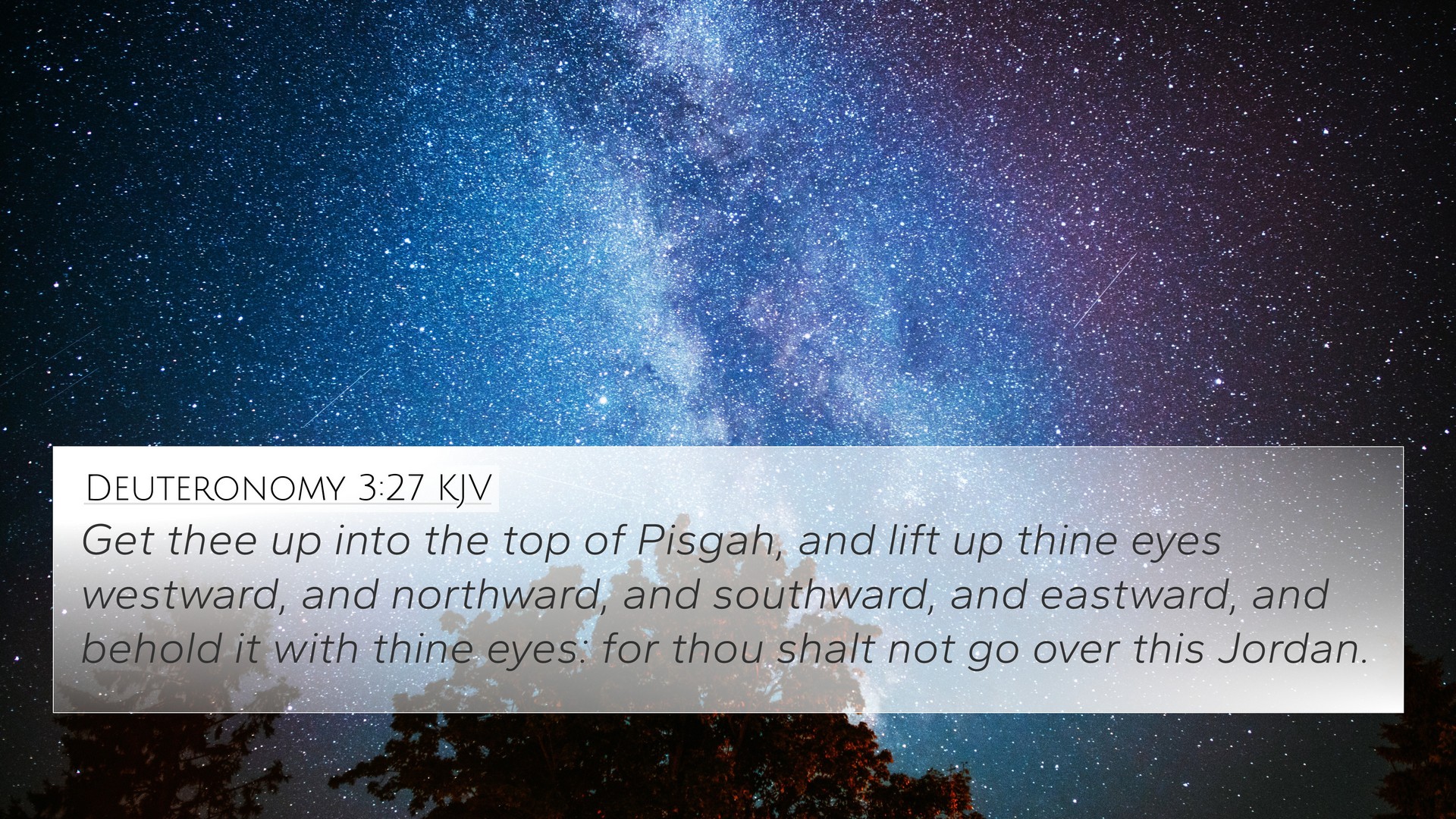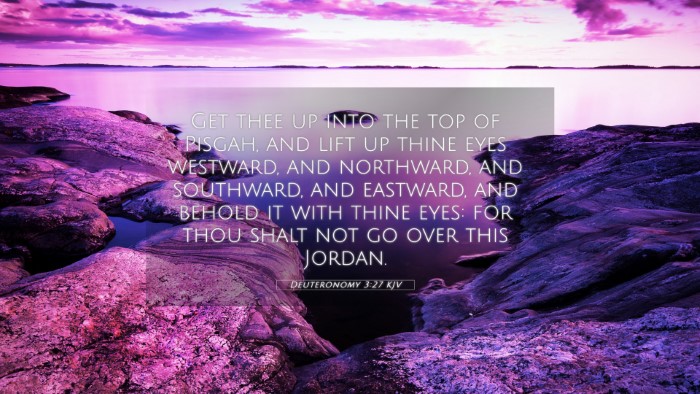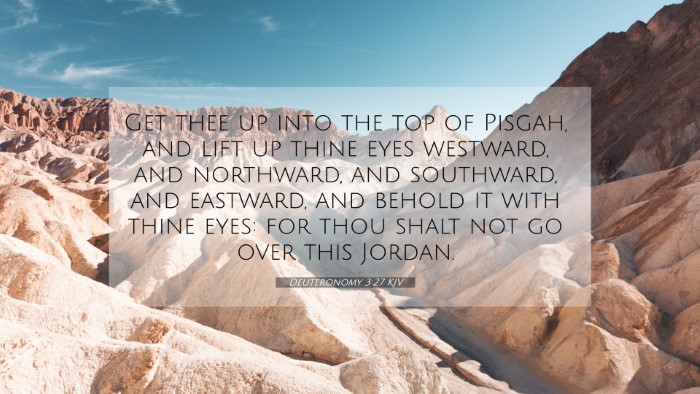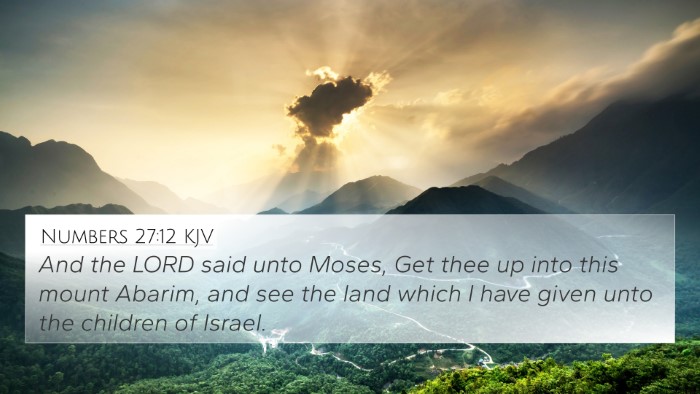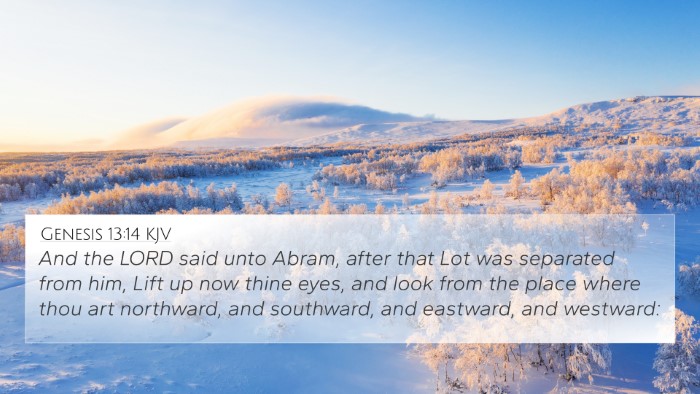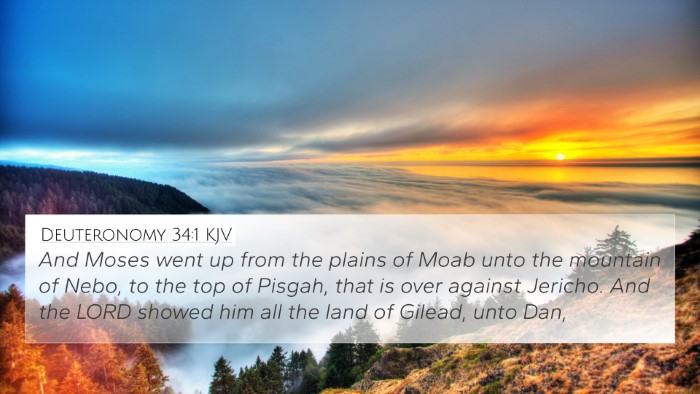Deuteronomy 3:27 - Verse Meaning and Interpretation
Bible Verse: Deuteronomy 3:27 - "Get thee up into the top of Pisgah, and lift up thine eyes westward, and northward, and southward, and eastward, and behold it with thine eyes: for thou shalt not go over this Jordan."
Overview of Deuteronomy 3:27
In this verse, Moses is instructed to ascend Mount Pisgah and observe the Promised Land from a distance, though he will not enter it himself. This moment highlights both the fulfillment of God's promise and the consequences of disobedience, showcasing the intertwining of judgment and grace.
Commentary Insights
This verse elicits deep theological reflections and insights on leadership, divine calling, and the intricate balance of God's justice and mercy. Below, we summarize insights from notable public domain commentaries:
Matthew Henry's Commentary
- View from Pisgah: Moses is granted a panoramic view of the land that the Israelites will inherit, underscoring the importance of God's promises and His faithfulness.
- Significance of Vision: The act of seeing from Pisgah represents hope and assurance for the people of Israel, reinforcing the idea that God keeps His promises, even if we personally do not experience them.
- End of Leadership: This moment marks Moses' close relationship with God and the culmination of his leadership, reminding us of the impermanence of human roles and the sovereignty of God.
Albert Barnes' Notes
- Geographical Context: Mount Pisgah, which is part of the Abarim mountain range, serves as a significant geographical landmark. It emphasizes the promise of land to the descendants of Abraham.
- Limitations Imposed by God: God’s instruction to Moses signifies a divine decision; even great leaders face consequences for their failures, a sobering reminder of accountability.
- Hope Despite Loss: While Moses would not enter the land, he still celebrates the promise fulfilled through the Israelite's future, encouraging believers to remain hopeful in God's plans.
Adam Clarke's Commentary
- Learning from the Past: Clarke emphasizes that Moses’ view is not just a reward but a lesson that despite his service, failure leads to consequences. It serves as a warning to maintain faithfulness to God.
- Theological Reflection: The verse invites deeper theological reflection on God's justice – even in Moses' case, God's will prevails, and His plans are not thwarted by human error.
- Fulfillment of Prophetic Promises: Moses’ ability to see the land reinforces the prophetic promises and acts as a bridge between the wilderness experience and the promise of a new beginning for Israel.
Bible Cross-References
This verse connects intricately with several other scriptures, helping to establish a comprehensive understanding of its meaning. The following cross-references are instrumental in drawing connections:
- Genesis 12:7: "And the Lord appeared unto Abram, and said, Unto thy seed will I give this land..." - The original promise to Abraham about the land.
- Numbers 20:12: "And the Lord spake unto Moses and Aaron, Because ye believed me not, to sanctify me in the eyes of the children of Israel..." - God's reminder about the consequence of disobedience.
- Deuteronomy 34:4: "And the Lord said unto him, This is the land which I sware unto Abraham, unto Isaac, and unto Jacob..." - God reaffirms His promise to Moses.
- Psalm 90:3: "Thou turnest man to destruction; and sayest, Return, ye children of men." - Reflecting on human mortality and God's sovereignty.
- Hebrews 3:16-19: "For some, when they had heard, did provoke: howbeit not all that came out of Egypt by Moses." - A New Testament reflection on Israel's journey and disobedience.
- Matthew 5:5: "Blessed are the meek: for they shall inherit the earth." - A spiritual parallel to the concept of inheritance.
- Luke 9:28-31: "And it came to pass, about an eight days after these sayings, he took Peter and John and James, and went up into a mountain to pray..." - A connection with mountain-top experiences and divine revelation.
Thematic Connections
The thematic connections from this verse are rich and can apply to various aspects of faith and human experience:
- Judgment and Mercy: The themes of God’s judgment for disobedience balanced with His mercy in promising the land to the next generation.
- Vision and Promise: Emphasizing the significance of spiritual sight and the hope that comes from God’s promises, even when individuals may not partake in them personally.
- Legacy of Leadership: Moses’ leadership journey serves as a blueprint for aspiring leaders in faith—highlighting both triumphs and the importance of adhering to God’s will.
- Transformation and New Beginnings: Drawing parallels with the way God transforms lives and circumstances, establishing new opportunities even after failures.
Conclusion
Deuteronomy 3:27 serves as a profound reminder of God's unwavering promises and the significant consequences of our actions. Moses' experience invites both reflection and inspiration, prompting believers to seek out connections between scripture and the message of hope, justice, and mercy that permeates the entirety of the Bible. By engaging in cross-referencing and exploring thematic connections, believers can deepen their understanding of scripture and apply its teachings to their lives.
